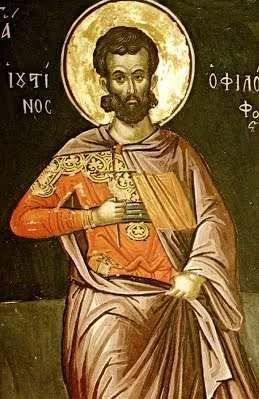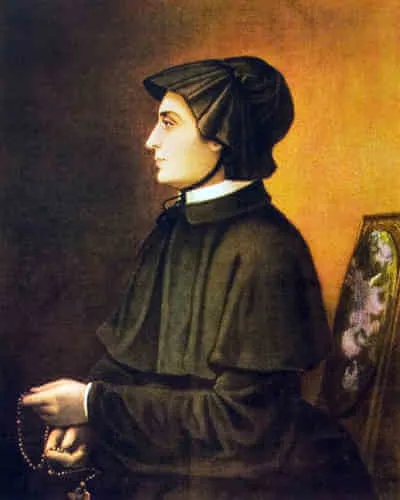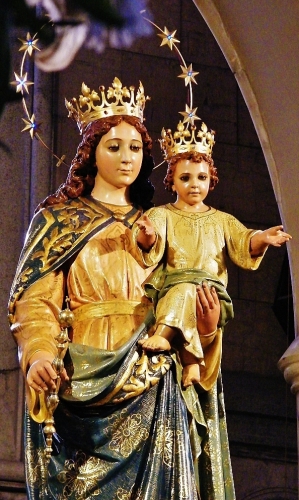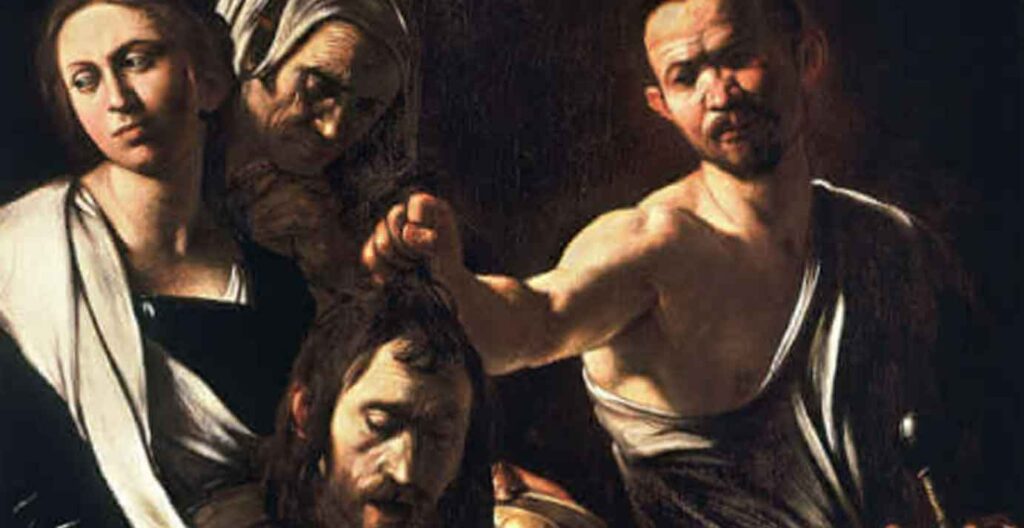c. 100–c. 165; Patron Saint of philosophers, lecturers, and apologists; Pre-Congregation canonization
“Justin, the son of Priscos, son of Baccheios, of Flavia Neapolis, in Palestinian Syria” is the way today’s saint describes himself in his Apologies, or “defenses,” of the faith. His hometown was in Samaritan territory, near Mount Gerizim, where the Samaritans continue to offer sacrifice today. It is also the location of Jacob’s well, where the Gospel story of the Woman at the Well took place. The city was largely populated by Roman pagans, and Justin was most likely raised as a pagan himself, being of Roman descent. He was well educated in Greek philosophy, in which he greatly excelled.
As a student of Greek philosophy, Justin moved from one teacher to another, trying to absorb all the wisdom he could. He took a special interest in Plato’s philosophy. Plato focused on immaterial “forms” as the basis of reality. Of this philosophy, he stated, “The perception of immaterial things quite overpowered me, and the contemplation of ideas furnished my mind with wings, so that in a little while I supposed that I had become wise; and such was my stupidity, I expected forthwith to look upon God, for this is the end of Plato’s philosophy.” Though he referred to philosophy as “the greatest possession, and most honorable before God,” he also discovered that philosophy alone—without revelation—was insufficient to arrive at the fullness of truth.
Justin’s conversion to Christianity began one day when he took a long walk to reflect on all he had learned from his philosophical studies. As he walked, an old man came up from behind and surprised him. The two began to converse, and the old man asked him what philosophy and happiness were. Justin responded, “Philosophy, then, is the knowledge of that which really exists, and a clear perception of the truth; and happiness is the reward of such knowledge and wisdom.” The old man then asked about Justin’s understanding of God. Justin replied that God was “That which always maintains the same nature, and in the same manner, and is the cause of all other things…” But the old man pressed him further, asking how philosophers can know God if they have never seen Him. After a lengthy conversation, the old man convinced Justin that his philosophy was insufficient to know God if it did not include revelation. This revelation began with the Old Testament prophets and was fulfilled in the Son of God made flesh. The old man concluded his conversation with Justin by saying, “But pray that, above all things, the gates of light may be opened to you; for these things cannot be perceived or understood by all, but only by the man to whom God and His Christ have imparted wisdom.” The conversation with the old man kindled a flame in Justin’s soul. He resolved to study the prophets and felt as though he had discovered the true reason for philosophy. Philosophy, used in conjunction with the revelation of the prophets and the Christ of God, would help people arrive at truth and come to know God Himself, Who is Truth. In that way, they could achieve eternal salvation, the only true happiness.
After his conversion, Justin used his keen mind to defend Christians against persecution by the Roman authorities. He founded a school of philosophy in Rome and regularly debated with the pagan Roman philosophers in public. Several of his writings still exist and are among the most articulate and valuable theological writings of the early Church.
Justin wrote his “First Apology” directly to Emperor Antoninus Pius. Although Antoninus Pius was relatively tolerant of Christians, persecutions continued on a local level throughout the empire. Since the emperor was the son of a philosopher and a philosopher himself, Justin used his philosophical knowledge to persuade the emperor to put an end to Christian persecution. Justin refuted the accusation that Christians were atheists because they refused to sacrifice to the Roman gods, and he presented Christianity as a noble and true religion with morally upright followers. Additionally, he provided a beautiful description of Christ and why Christians worship Him as God, as well as one of the earliest descriptions of Christian worship. This description is of great importance to the theology of the Mass, as it highlights the unbroken tradition and correlation of liturgical celebration from the early Church to today.
Justin addressed his “Second Apology” to the Roman Senate and continued to defend Christians against false accusations, such as claims of cannibalism and sexual immorality. He attributes those lies to demons. After giving a strong defense, he goes on to proclaim Christianity as the true faith, the practice of worship of the true God, and the way to Heaven.
Several other of Justin’s works have survived, such as his “Dialogue with Trypho.“ Trypho was a Jewish rabbi whom Justin tried to convince to convert to Christianity. He explained that Jesus was the Messiah and the fulfillment of the prophecies in the Hebrew Scriptures. The conversation becomes quite animated, and Justin’s philosophical approach is grounded in sound reasoning and articulate explanations. In all of his writings, Justin clearly loves the pursuit of truth, finding the fullness of Truth in the Person of Jesus Christ.
Justin’s strong, clear, and bold defense of the Christian faith caused such a commotion that he was arrested and put on trial during the reign of Emperor Marcus Aurelius. Marcus Aurelius had appointed his revered teacher, Junius Rusticus, as prefect of the city of Rome. As prefect, Rusticus fiercely persecuted Christians. Around the year 165, Justin engaged in a public debate with a Greek philosopher named Crescens. Crescens was so outraged by their debate that he reported Justin and six of his companions to Rusticus, who had Justin and his companions arrested and put on trial. An eyewitness beautifully preserved the discourse between Rusticus and Justin. After being interrogated by Rusticus and threatened with torture and death, Justin responded, “We hope to suffer torment for the sake of our Lord Jesus Christ and so be saved. For this will bring us salvation and confidence as we stand before the more terrible and universal judgment-seat of our Lord and Savior.” At that, Rusticus pronounced the sentence on Justin and his companions, “Let those who have refused to sacrifice to the gods and to obey the command of the emperor be scourged and led away to suffer capital punishment according to the ruling of the laws.” With that, Justin and his companions were beheaded.
Saint Justin Martyr heroically defended the Christian faith, using his natural intellectual gifts in conjunction with revealed theological truths. He was bold, articulate, determined, and evangelistic. He did not fear death; he only feared the continuance of ignorance. His burning desire was that everyone would come to the full knowledge of Jesus Christ, his Lord, and God. As we ponder this great saint, let us consider our own depth of commitment to proclaiming the Gospel in a confused world. Let us pray that we will also have the wisdom and courage that Saint Justin had, so that through us, others will know and love the saving message of the Gospel.
Source: https://mycatholic.life/saints/saints-of-the-liturgical-year/june-1—saint-justin-martyr–memorial/








